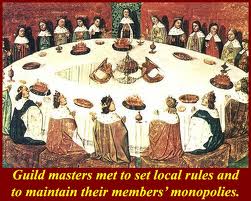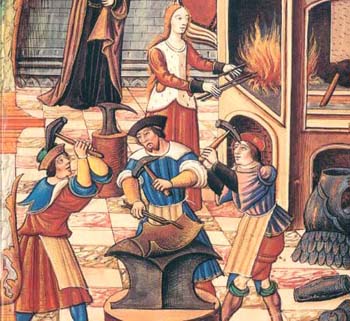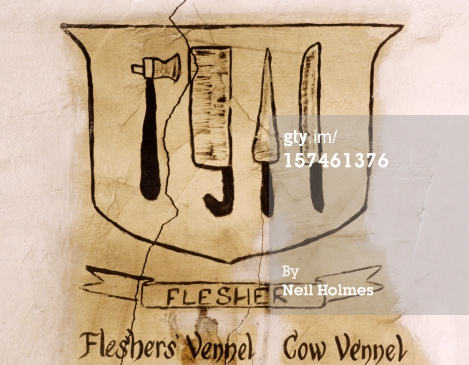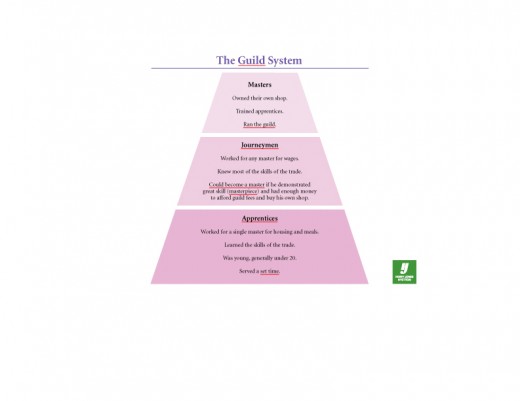Medeival Keynesianism

In early medieval towns it was common practice for tradesmen to form guilds. A guild was essentially a trade association with a charter (or approval) from the local town or city government. Guilds were more than just an association or union in the modern sense though, because they operated a monopoly on whatever their trade happened to be. Guilds first formed as a way to tear town charters away from the aristocracy; and evolved their associations with craftsmen later (Bennet 2011, 158-159). These guild associations held a trade monopoly over the city they were located in. Guilds weren’t just a collection of like-minded folks however; they formed a strict set of rules that every member had to follow and generally speaking outsiders and religious minorities were not allowed. Guilds often retained the political functions formerly executed by the Prince of the town, so they were actually very powerful and it is understandable that membership was both limited and conditional.

The rules of the Southampton Guild association set down the ground rules for home the guild will function, how members should act and how the business in the city should be run. The Guild represented a monopoly on most kinds of trade. Consider rule# 20 from the Charter:
“20. And no one shall buy honey, fat, salt herrings, or any kind of oil, or millstones, or fresh hides, or any kind of fresh skins, unless he is a gildsman: nor keep a tavern for wine, nor sell cloth at retail, except in market or fair days; nor keep grain in his granary beyond five quarters, to sell at retail, if he is not a gildsman; and whoever shall do this and be convicted, shall forfeit all to the king.” (Cheyney 1897)
According to this rule you need to be a member of the guild in order to by any number of valuable trade goods, to have a tavern, sell anything at retail, or keep more than a small amount of grain. If you do any of that whatever you make from doing so is forfeit to the king. According to rule #19 unless you are a member of the guild you cannot even buy something in the city of Southampton if you have the intention of reselling it in the same city! So these rules are what sets up the basic framework for the complete monopoly in the city. It is hard to understand such thinking for a person who lives in a modern capitalist economy; it seems positively tyrannical for any organization, governmental or quasi-governmental to have so much control over the economic life of an entire town. However, it becomes clear from the text that there was a major concern with poverty and economic instability at the time. In fact, three of the rules set out rules for giving to the needy, and the poor of the town are mentioned at least 3 other times. Specific rules are set out for what to do if a guild member falls into poverty. The reason for the intrusive trade restrictions and monopolistic practices was that the guild members considered this type of patriarchal control to be heroic. If heroic seems like too strong of a word, consider that the guild gave away parts of it’s massive wealth to the poor every time it meant, and that it took pains to help the sick and needy. The guild members considered their position not to be as “robber-barons” bent on making every cent they could; but rather looked at themselves as managers of the economy whose job it was to keep prices stable and avoid economic catastrophe. This was not a task taken lightly or something they used exclusively to benefit themselves; instead this economic management was the way to insure stability and was a responsibility as well as a privilege.

Economic control as a ways to insure economic stability was the chief virtue of the guild with it’s goal being to create and maintain a prosperous city; to this end it was those things which might upset the economic balance that would have been thought of as bad. In this way medieval guilds followed an economic pattern reflecting the same goals and values as the much later Keynesianism. Following that logic, anything that may have challenged the guild’s economic mastery of the town would be villainous. Rule #19 was mentioned above; let’s examine it in closer detail:
“19. And no one of the city of Southampton shall buy anything to sell again in the same city, unless he is of the gild merchant or of the franchise. And if anyone shall do so and is convicted of it, all which he has so bought shall be forfeited to the king; and no one shall be quit of custom unless he proves that he is in the gild or in the franchise, and this from year to year.” (Cheyney 1897)
According to this rule you have to belong to the guild to sell anything at all in the city. This is the sort of economic restriction that may seem intrusive, even meddlesome but actually it was an attempt at controlling prices and this was meant to help the poor afford goods. It was also a way to ensure that local artisans and tradesmen were the one’s who would benefit from goods sold in the city. For traveling merchants, they could sell goods in Southampton bought elsewhere, but they had to pay a tax on it, meaning it would be harder for outsiders to compete with equivalent goods made in the same city. Once again, the logic here was to control prices and keep them at a steady rate. This was to both fight instability as well as keep artisans in business and citizens fed and clothed.
For the medieval guild of Southampton economic control meant an escape from potential recession and depression, the same stability sought by different means by the "regulated-capitalism" economies of the West today. Given the extreme nature of some of the disasters, both economic and political during the period it is little surprise that guild members attempting to bring stability to the price and quality of goods saw themselves in a heroic light. Stability and guild control was good to them. In the same way, Keynesianism became a popular philosophy after the great depression; desperate times call for desperate measures. On the other hand, potential outsiders who might undersell local competitors were villains to the guildbecause they threatened the constancy of price and quality control and therefore had the potential to upset the city’s economic balance. For medieval guilds the name of the game was stability and quality control. The issues raised here are not all that different from current debates about jobs moving overseas and the push for consuming locally produced goods.





